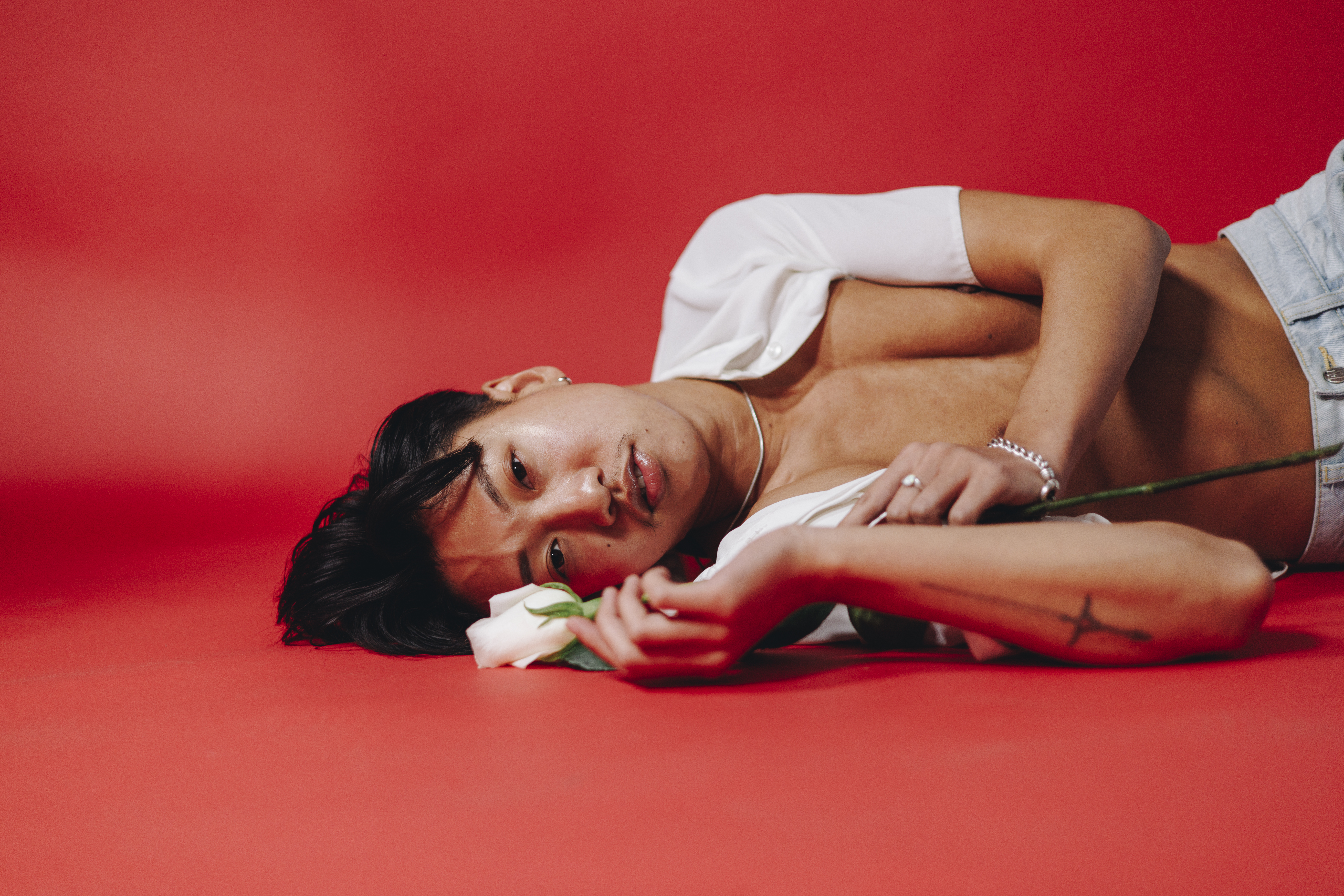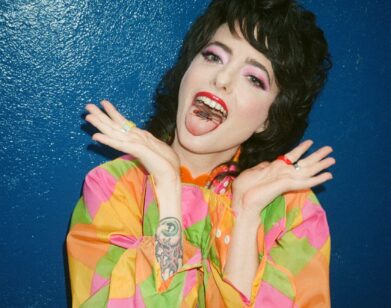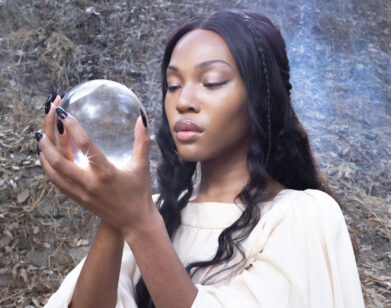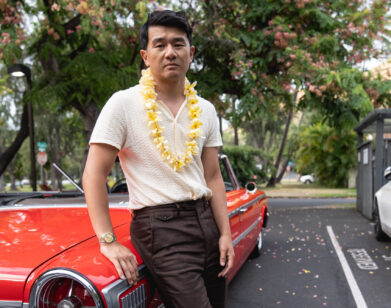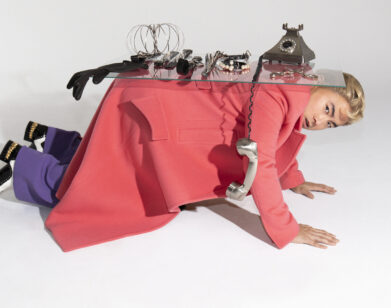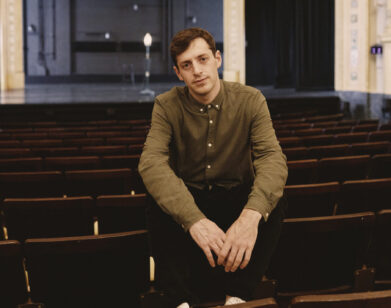STAND-UP
Jes Tom Tells Us How to Maneuver the “Dyke to Fag Pipeline”
Jes Tom is a tree and a sprout. On three occasions over two years, I’ve seen the comedian and writer’s solo show Less Lonely, and each time they have refined more and more this process of growing in reverse, or “Benjamin Buttoning,” as Tom jokes on stage. In its most recent Off-Broadway run, their body is loose and flowy, Tom’s sense of embodiment as playfully limp as the billowy white shirt and wide-legged black pants they wear on stage. Over the last couple of years, during which they started taking testosterone and doing poppers, they’ve been learning how to slay, in the homosexual sense.
This is what first struck me about Tom, who I saw with Joel Kim Booster and Brandon Scanell at an oppressively chic hotel basement venue four years ago: the control they have over their actual gestures, from the flip of their hair to a scrunched-up expression of discovery, which combines, oil-like, with their know-it-all dynamism. Less Lonely, once a show about apocalypse romance in the age of COVID, has now become, through the inverse of its extremely specific point of view, an existential interrogation of what it means to grow and become a queer person through action, gesture, and embodiment. From the ancient butch-ish lesbian they once were to the hard and wispy twink they are now, Tom’s process of exploring what it means to be less lonely is wrapped up in more than just the differences between how groups of people negotiate sex, but how they navigate being in and of itself.
Last week, after closing night, we talked about doing comedy on the anniversary of the capitol insurrection, how the cultural expectations of stand up differ from those of theater, and having a quintessential gay experience: spotting a recent hookup in the front row.
———
KYLE TURNER: Hi, Jes. Congratulations on your run.
JES TOM: Thank you.
TURNER: You just ended on the two-year anniversary of the capitol insurrection.
TOM: It was January 6th and I was worried that people wouldn’t be there because they had somewhere else to be. But they came.
TURNER: They did come. How did the last performance feel?
TOM: It was fun. I tried to be present and have fun because I was like, “This is the last time I’m going to be doing this for now, so I better enjoy it.” I had a lot of fun. The audiences were awesome, especially for the last two shows.
TURNER: Your show is very much about the notion of embodiment. Have you changed your performance over the course of this two-year development period?
TOM: I’m trying to learn to be a much more dynamic performer. As a stand-up comic, I’ve classically been very deadpan, very NPR, very still. Through this experience of developing this show, I’ve learned how to be more dynamic and create a show that’s fun to watch, also.
TURNER: Is the process of getting more into your body on stage different than getting more into your body off-stage?
TOM: I’m addicted to work. I love work. When I have a work goal, that inspires me a lot more than like, “Oh, I’m going to this gay party, I have to start working out.” I started seeing a fitness trainer so that I could do seven shows a week. Then the cherry on top is that it has this socio-cultural effect as well.
TURNER: Do you find there’s a big difference in terms of doing a 75-minute set versus stand-up where it was shorter chunks of performance time?
TOM: Stand-up is so casual. There’s a self-destructive stereotype about stand-up. The idea that you’re going out late at night, maybe you’re drinking or smoking weed or doing drugs.
TURNER: Which you don’t do anymore.
TOM: Oh, I don’t. I’m squeaky clean. I’m a virgin. I haven’t done a thing. Staying out in bars and clubs and partying, and then almost moving more into the theater space, I responded to the formality of theater and this idea that, in theater, your body is your instrument. Which is literally true for stand-up, but stand-ups don’t really treat it that way. I started being more mindful this run.
TURNER: What was it about this run?
TOM: I had to take it very seriously. The cultural expectations of a stand-up show in a theater space are different. In a comedy club, I could be high out of my mind on stage, I could be drunk off my ass, and everybody else in the room will just be like, “Ah, the comedian was drunk.” But in a theater, that’s not acceptable. I have to be giving my best show the whole time. There was a stretch of four days where I had a stomach virus, which was crazy, but the job is that I go on stage and I act like everything’s fine.
TURNER: Was there ever a desire to challenge those established norms for theater? The best part of the show, the night I saw it, was when the audience visibly reacted to your taste in porn.
TOM: By doing standup in the theater, that was already challenging that norm. People were shocked that I looked out and acknowledged the audience. Already the bar was so low. I’d acknowledge someone’s phone going off, and it was like, “Ooh, you can see us?” And I was like, “Yeah, it’s standup comedy, I can see you and I’m here in the room with you every night.” I had to guide the audience into that, whereas in traditional standup comedy, that’s the expectation.
TURNER: Have you had any encounters where a joke that you had initially written satirically ended up reaffirming the satire you were doing?
TOM: I posted a clip on Instagram of my joke about the LGBTQIA community. “There’s no such thing as the LGBTQIA community that’s like being like the dog, cat, bird, bear, fish, lizard, beaver community.” This was on Instagram, not in real life. So naturally it offset massive discourse.
TURNER: Love that.
TOM: It was really smart and intelligent and nuanced. But people didn’t get that I was telling a joke and not making a statement. I am trying to make a joke about all of us arguing like this. That’s the joke.
TURNER: Do you think doing the show has given you clarity on different perspectives in queer cultural discourse?
TOM: Can you ask another way?
TURNER: As a person of faggot experience, do you have a better understanding of other faggots now?
TOM: Yes. It’s funny, because you saw it quite early on. The show continued to change after that. There are certain things that, by the end, I learned that were different from the beginning. I ended up doing a whole bit like, “Oh, I learned I’m a bottom.” I realized after doing the show a bunch of times that people weren’t surprised by that. Whereas, initially, and when I was doing it in clubs, people were surprised by that. I just learned people were reading me a certain way.
TURNER: Now that you’re wearing flowy tops and billowy pants.
TOM: Did I say the thing when you saw it? Was I already saying the thing about, “Look, your vintage Yohji Yamamoto, it’s not giving dom top.”
TURNER: I’m wondering, when you began this show, it was apocalyptic and through the lens of COVID. How does the apocalypse feel to you now?
TOM: In the beginning, you’re right, it was about the apocalypse through the lens of COVID. And I had a fear for a while that the show would become less relevant as we moved further away from the beginning of the pandemic. But the snowball is still snowballing, and it’s just about me updating, continuing to move the show along so that it responds to however the world is ending, or seems like it could be ending as time goes on.
TURNER: I really loved the moment when you’re talking about being on the dance floor and you look around and see all these older gay men, and it makes you reflect on pursuing an apocalypse romance. How did you come to write that portion?
TOM: I want to be clear that in real life, it’s totally fine to be an older gay man or an older person of any identity who’s single.
TURNER: Yeah, I don’t mean to suggest that you’re portraying it in a negative light.
TOM: But it was interesting looking out into the crowd and it includes a lot of older gay men. I started to be like, “Huh, is this insulting?” When, really, it’s a story device. I have a friend who’s a younger gay man and his type is daddy bears. He’d tell me stories about sleeping with really emotionally immature, older men who just really hadn’t figured their shit out. That’s what I was thinking about when I was coming up with that turn, the ways that, culturally, gay men end up getting isolated when it’s not really their individual fault.
TURNER: Right. Lesbians do this, gay men do this. One of the things you illustrate is that gay men, under patriarchy, are not necessarily socialized to process emotions in a healthy manner.
TOM: Totally.
TURNER: I’m curious how that awareness shapes the narrative and emotional trajectory of the show.
TOM: It’s so interesting. In my sort of dyke to fag pipeline, I sometimes describe it as “Benjamin Buttoning.”
TURNER: With more jockstraps.
TOM: Yes. As though I was this wizened, experienced, tortoise of a person who has seen the ways of the world and now suddenly, I’m like, “Who has poppers? Does anyone have ketamine?” The number of words that I use has gone down. My vocabulary is like, 50 words.
TURNER: Mother.
TOM: Mother is mothering. That’s a full sentence in the gay male community. Or just, “It’s giving,” but we don’t even know what it’s giving.
TURNER: To whom?
TOM: What is it and to whom?! That is reflected in the narrative of the show going from old to new. By the end of the show, what I’m trying to do is find the hope and the possibility in something new rather than what I joke about, which is that my brain has gone smooth. The show is about learning that I’m fallible. Learning that I don’t know everything.
TURNER: Are you feeling the fun in being fallible?
TOM: I enjoy doing those parts a lot. Starting with the bottom thing where I’m like, “Fine, everybody could see that.”
TURNER: With regards to that perception from the audience, do you ever think about the racialization of bottom identity?
TOM: It’s interesting because actually, in my dyke life, the way that my race presented itself was that there’s a phenomenon among dykes that more beautiful femme white woman date cool masc, people of color. That’s totally a thing all the time. That’s where I sat in those spaces. I was dating these gorgeous, beautiful, often white girls, and I was their hot masc brown person. It didn’t matter. It’s interesting because gay guys will ask me this all the time. They’re like, “Oh, is there a lesbian equivalent to a rice queen?” I’m like, “No, not really.” We’re more considered all in the mix with each other. There’s not as much specificity with the fetishism. Whereas, as you know quite well in the gay man world, there’s a pretty distinct feminization of Asian men that matches a basic Western reading of Asian people in general. I’m trying to play that because the audiences have been really diverse. It’s a little hard to be simultaneously playing on the perceptions that dyke-styled people will have of me versus the perceptions that fag-styled people will have of me, which might even be opposite projections.
TURNER: How does it feel to be caught in that collision?
TOM: The jokes just have to hit.
TURNER: How has your relationship to your artistry changed?
TOM: I think this graphs with the move from comedy clubs to theater and casualness to seriousness. I feel quite serious about what I do these days.
TURNER: What does serious mean here?
TOM: I understand, in a comedy club, everybody’s here to have fun. Now I’m in a Tik-Tok which-words-are-magic mode.
TURNER: You’re getting more woo woo.
TOM: I’m getting more woo, and I’m getting more sort of like, “Oh, talking about this stuff in this way unlocks things for people.” I can sort of take it for granted because I’ve been moving through queer space for so long, which is what the show is about. And having all these different experiences that are my normal, because I started at gay. Other people have not necessarily had those experiences, or they’ve had them a different way, or maybe they’ve never heard of any of this at all. Maybe they’ve never done anything like this, and it feels a little magic to be telling this story to people who maybe haven’t thought of things this way.
TURNER: It’s good to find magic in the world, especially now.
TOM: There is magic, but you do have to find it.
TURNER: That’s a great note to end on.
TOM: Well, sorry. You want to end it, but I want to tell you a story.
TURNER: Okay.
TOM: On the last Wednesday of the show, I walked down on stage and in the front row was a guy I had my last two hookups with just five days before or something. I had seen this guy a couple of times, and then there he was in the front row.
TURNER: Uh-huh.
TOM: And that had never happened to me before.
TURNER: Really? That’s surprising to me.
TOM: What was funny about it was he didn’t come on purpose. His friend had invited him to a show and he didn’t know what it was going to be.
TURNER: Did you talk after?
TOM: We did. It was this crazy gay moment because I didn’t know anything about him. I didn’t know his name. I didn’t have his phone number. We hadn’t talked at all. Then suddenly, he knew all this stuff about me. Usually, I’m very guarded and withholding with guys I meet off apps. I usually don’t really tell them what I do, I give them a fake name, and then all of a sudden I was talking for 75 minutes about basically the entire course of my life, including some really intimate stuff. Then afterwards he hit me up on Grindr because that was the only way we had contact with each other. I invited him over, and then I grilled him about his life, because I was like, “It’s not fair.” I need to karmically balance the energy that we have passed between each other.
TURNER: Was it worth it?
TOM: We had fun sex, so.
TURNER: You’re finding joy in the process.
TOM: I’m at least finding some guy who’s in the front seat of my theater show.

